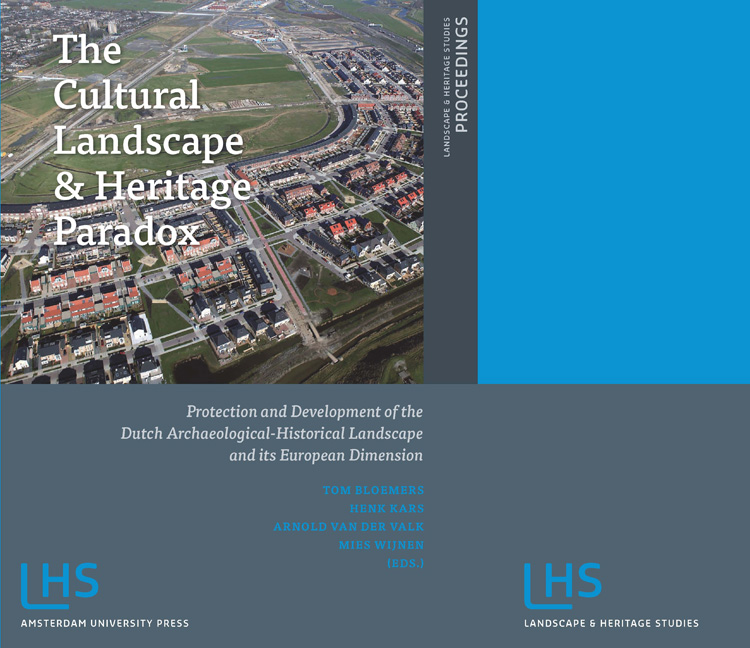 The Cultural Landscape and Heritage Paradox
The Cultural Landscape and Heritage Paradox Book contents
- Frontmatter
- Contents
- Preface
- I INTRODUCTION
- II INSIGHTS AND PROSPECTS OF ARCHAEOLOGICAL-HISTORICAL LANDSCAPE STUDIES
- III LINKING KNOWLEDGE AND ACTION
- IV IMAGINATION - FACTS AND CONSTRUCTIONS
- V SHARING KNOWLEDGE - STORIES, MAPS AND DESIGN
- VI SYNTHESIS AND CONCLUSIONS
- VII MANAGEMENT OF KNOWLEDGE
- VIII AGENDA FOR THE FUTURE
- IX SUMMARY
- X APPENDIX
- Subject Index
- Index of Places and Regions
3 - The role of Historical Expertise in Today’S Heritage Management, Landscape Development and Spatial Planning. Comment on ‘The Biography of a sandy Landscape’ by Nico Roymans, Fokke Gerritsen, Cor van der Heijden, Koos Bosma & Jan Kolen
Published online by Cambridge University Press: 21 January 2021
- Frontmatter
- Contents
- Preface
- I INTRODUCTION
- II INSIGHTS AND PROSPECTS OF ARCHAEOLOGICAL-HISTORICAL LANDSCAPE STUDIES
- III LINKING KNOWLEDGE AND ACTION
- IV IMAGINATION - FACTS AND CONSTRUCTIONS
- V SHARING KNOWLEDGE - STORIES, MAPS AND DESIGN
- VI SYNTHESIS AND CONCLUSIONS
- VII MANAGEMENT OF KNOWLEDGE
- VIII AGENDA FOR THE FUTURE
- IX SUMMARY
- X APPENDIX
- Subject Index
- Index of Places and Regions
Summary
ABSTRACT
Cultural landscapes undergo constant transformations over time. The determinants influencing this development and the stakeholders involved in the process have been analysed by Roymans et al. (Ch. V.2). Their approach to biographical studies of landscapes was applied in the South Netherlands project and considered both research and practice of heritage management.
The biography approach delivers an interesting landscape genesis based on historical narrative. This knowledge provides additional information by combining different methods and can complement quantitative approaches to landscape research. It points out continuities and breaks in landscape development and the underlying reasons. Therefore, the biography approach elaborates the historical layeredness of a landscape with a focus on the community level.
This comment analyses and interprets the core themes addressed by the authors and evaluates their applicability with regard to the necessities in today's heritage management, landscape development and spatial planning. The focus of this comment is on the opportunities and constraints of inter- and transdisciplinary research on landscapes.
In addition it presents some results from the ‘Landscape Typology for Switzerland’, a project conducted within the action COST A27 LANDMARKS. Though Switzerland has less than half of the population of the Netherlands, i.e. 7,667,715 persons on a surface area of about 41,000 km2 (http://epp.eurostat. ec.europa.eu. Accessed on 11 May, 2009), the country faces similar challenges, particularly with increasing urbanization as well as climate change and their impacts on landscape development and spatial planning.
KEYWORDS
Cultural landscape, heritage management; spatial planning, socio-cultural determinants; landscape typology; knowledge transfer; sustainable development
STORY LINES: LINKING PAST AND PRESENT
Roymans et al. (Ch. V.2) illustrate the biographical approach of landscape studies in the South Netherlands project alongside three narratives from the Urnfield period (700-400 BC), the Christianization period (1000-1300 AD) and the period of large-scale heathland reclamation (1850-1950 AD). These narratives highlight several core themes which are also relevant for today's heritage management, landscape development and spatial planning:
- land appropriation and land use;
- identity constructions of the local communities;
- socio-cultural determinants of landscape change including aspects of institutional regime and participation; and
- polarization between intensification and extensification of land use.
- Type
- Chapter
- Information
- The Cultural Landscape and Heritage ParadoxProtection and Development of the Dutch Archaeological-Historical Landscape and its European Dimension, pp. 407 - 414Publisher: Amsterdam University PressPrint publication year: 2010
- 1
- Cited by
